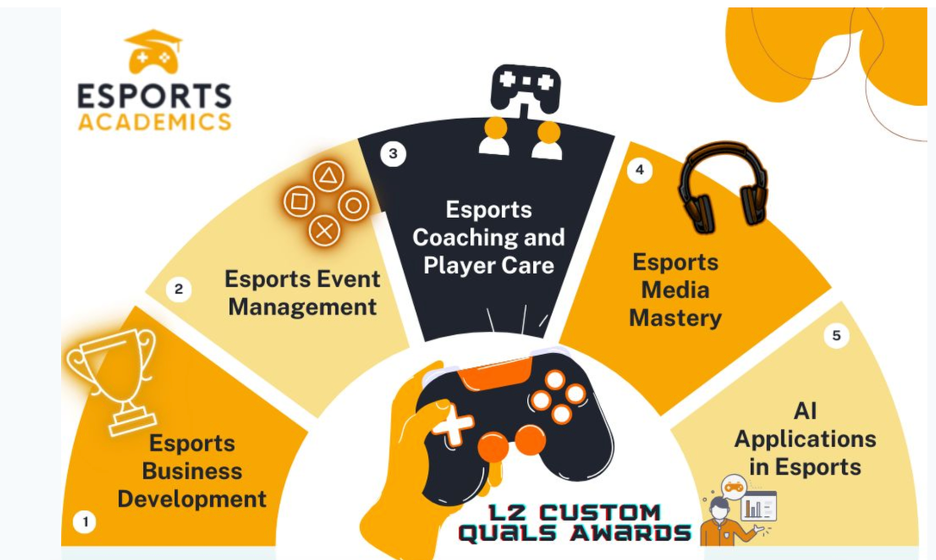
By Elke Porter | WBN News Vancouver | May 30, 2025
Subscription to WBN and being a Contributor is FREE!
As the global esports market continues to surge in both audience and economic value, forward-thinking investors are turning their attention to a unique segment of the industry: education.
Leading the charge in this space is Esports Academics, a Canadian company revolutionizing how esports is integrated into educational systems, particularly in high schools and universities.Founded by George Cork, a Canadian esports enthusiast with a BSc in Computer Systems and Networks from the University of Plymouth, Esports Academics was born from a passion for competitive gaming and a vision for its educational potential.
Cork’s early involvement in education advocacy, including his role as a Youth Councillor for the Kent Youth County Council (KYCC) in the UK, where he championed the “Curriculum For Life” initiative to teach practical life skills like financial literacy and taxes, shaped his approach to innovative education.
His expertise in the collegiate market and esports has led to notable recognition, including being shortlisted as one of the top 35 CEOs under 35 globally in 2019 and an invitation to exhibit at Collision 2019. Cork has also delivered guest lectures at universities worldwide and appeared on panels at renowned events to discuss the impact of esports in education.
Esports is important for students to learn because it offers a unique blend of educational, professional, and personal development opportunities that align with the demands of the modern digital economy. Below are the key reasons, grounded in the context of the Esports Academics article and broader trends:
- Career Pathways in a Growing Industry: The global esports market is booming, projected to reach $4.3 billion by 2026 (per Statista). Esports education equips students with skills for diverse roles like game design, marketing, event management, and broadcasting, preparing them for careers in a high-demand sector.
- Skill Development: Esports programs, like those from Esports Academics, teach transferable skills such as teamwork, strategic thinking, communication, and problem-solving through project-based learning. For example, their NCFE-partnered curriculum includes Esports Business Fundamentals and Entrepreneurship, fostering practical abilities applicable beyond gaming.
- Engagement and Motivation: Esports makes education engaging, as highlighted by George Cork’s mission to make learning enjoyable. By integrating gaming—a medium students already enjoy—into curricula, it boosts motivation and participation, especially for those disengaged by traditional education.
- Digital Literacy and Technology Skills: Esports education exposes students to cutting-edge technology, from game development software to streaming platforms, enhancing digital fluency. While tools like Cloudbrink weren’t confirmed in Esports Academics’ offerings, such programs often involve tech integration, preparing students for a tech-driven world.
- Inclusivity and Community: Esports fosters inclusive environments where students of varied backgrounds can collaborate, building social skills and a sense of belonging. Competitive gaming teams encourage leadership and camaraderie, valuable for personal growth.
- Future-Ready Education: As digital industries expand, esports education aligns with global workforce needs, teaching students to adapt to rapidly evolving sectors. Esports Academics’ focus on industry-aligned curricula ensures students are ready for university or direct industry entry.
Esports Academics focuses on partnering with educational institutions to deliver tailored esports curricula, primarily for Grades 9 to 12, though its influence extends to higher education. Cork himself has been teaching the Esports Management course at Mount Royal University in Alberta, Canada, for over a year, emphasizing esports operations and practical skills to prepare students for industry careers.
Esports, short for electronic sports, encompasses organized, competitive video gaming at amateur and professional levels, spanning disciplines such as game design, live broadcasting, business management, and marketing. As the industry grows, the demand for skilled professionals is rising, and Esports Academics addresses this need through structured, industry-relevant education.
Through a three-year partnership with NCFE, a leading UK awarding organization, Esports Academics has developed a robust entry point into the esports industry. This collaboration delivers project-based, hands-on qualifications in areas such as Esports Business Fundamentals, Marketing and Branding, and Entrepreneurship. Designed with input from industry experts, the curriculum equips students with actionable skills for university or direct industry entry, aligning with the evolving needs of the global esports sector.
They are also happy to confirm their attendance at Web Summit Vancouver in May 2025. They can't wait for the opportunity to showcase the programs growth in the last 6-12 months later on today on Friday, May 30th, 2025.
For investors, Esports Academics represents a compelling opportunity. By training the next generation of esports professionals—not just gamers, but also managers, marketers, and creators—it is building the workforce for a booming industry. In a world where digital skills are paramount, this Canadian innovator is paving an educational pathway to esports success. https://esportsacademics.com/
#Esports Education #Esports Academics #Gaming In Schools #Esports Careers #Education Innovation #Future Of Gaming #WBN News Vancouver #Elke Porter
Connect with Elke at Westcoast German Media or on LinkedIn: Elke Porter or contact her on WhatsApp: +1 604 828 8788


